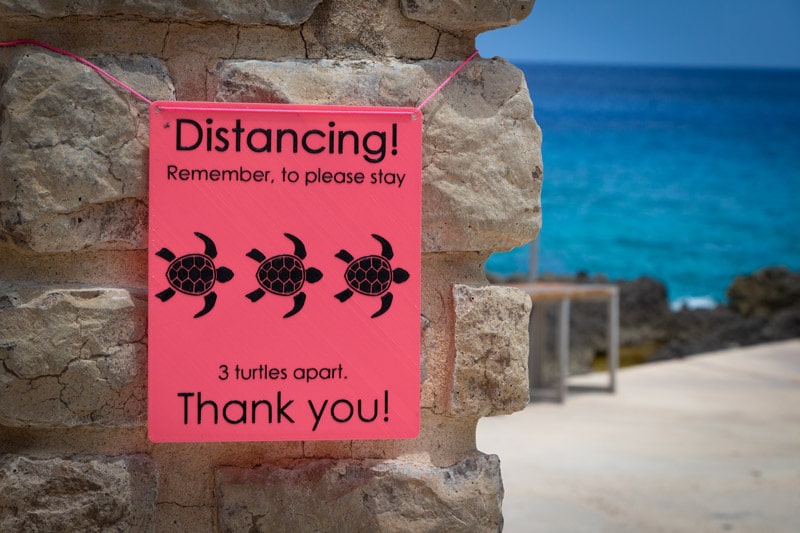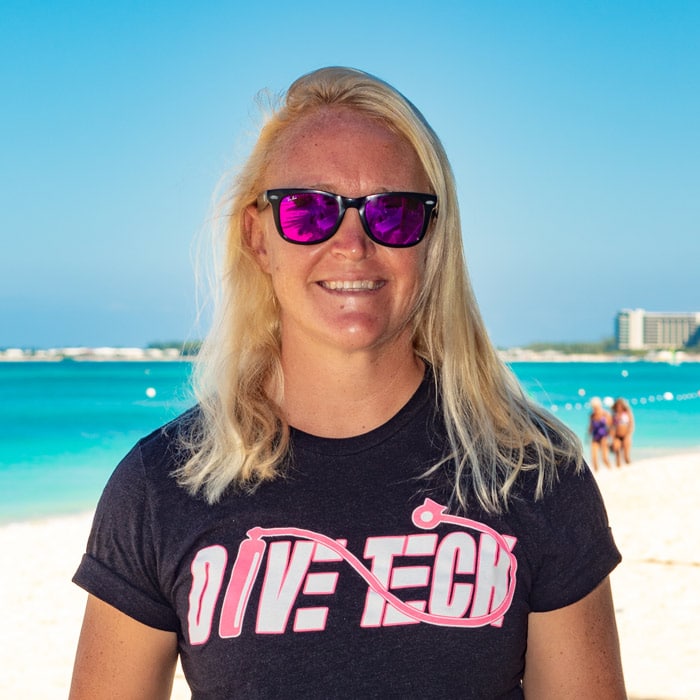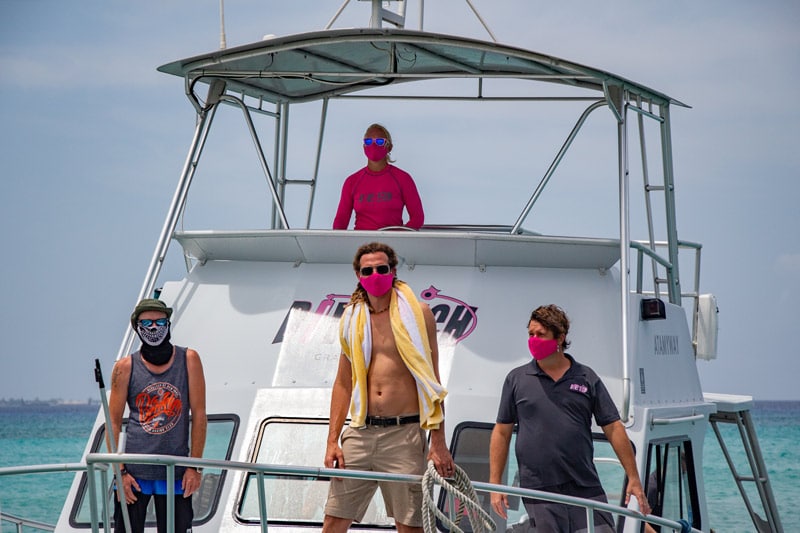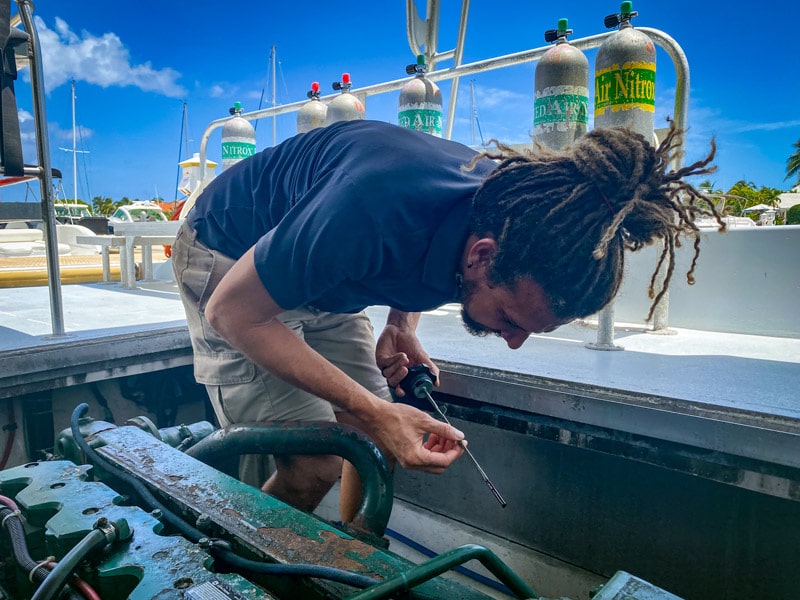Cayman and the Virus

By Drew McArthur
In West Bay Grand Cayman, local divemaster Ragime Powery is aboard Divetech vessel Atamyway. His job is to turn the engine over to prevent it from seizing and generally make sure everything still works. The captain who used to take out dive charters twice a day, seven days a week would usually carry out these tasks but as of March 22nd this year the country closed its doors to the outside world meaning Atamyway, and the dive industry around it, would be out of action until further notice.
Mr Powery recalls “It was a crazy time, we were set to be moving into a busy period and although we had heard bits about the virus on the news, it hadn’t really hit home here. Then there was a lot of talk on the island about mass cancellations of vacations and before we knew it the cruise ships were turned away and then the government closed the airport.” The closure that was originally set for three weeks was then extended until September 1st to allow to the government of the Cayman Islands to pursue their goals of managing the virus, which was to eradicate it and to ensure that no Caymanian citizen died from the disease.
When the news came out, dive operator Jo Mikutowicz from Divetech was shocked by the rapid developments.
“My first thoughts were that the government were taking a brave move, they were acting on behalf of their people and putting lives before business which is something that many other countries resisted. But as we started to make appropriate plans to shut the business down for the longest period it has been in its 25 year lifespan I couldn’t help wondering how we, and other companies on the island, were going to survive.”
At a time of the year when the inbox should have been welcoming a steady flow of reservation enquiries, it was instead bombarded with cancellations. Fear and uncertainty abounded and the news continued to get worse.

Ms Mikutowicz explains, “After the airport shut, our intention was to try to work with the considerably smaller business afforded by the dive community who live on the island but curfews were imposed that banned diving and any other water based activity. It seemed like every time we adjusted to the rules, they would get tighter until eventually the island went into a temporary state of full lockdown.”
Mr Powery continues, “Just before everything shut, there were all kinds of rumours flying around the island about what was going to happen, we just didn’t know. As soon as the port was closed we heard of people losing their job straight away then when the airport closed most of the people I know who work in diving on the island were also laid off. When the government told us that there wasn’t likely to be any external tourism till at least the end of the year, they advised expats like the ones I work with to go home but the truth is, most of them consider Cayman to be their home.”
Throughout the Cayman Islands and indeed the world as a whole, the industry shuddered. Overnight the vast majority of dive professionals lost their jobs until further notice and a wealth of businesses went bust. Travel restrictions, curfews, financial uncertainty and a disinclination for people to be in mixed company meant that the boats remained at dock and everybody took an extended surface interval.
Mr Powery describes the uncertain times, “Many people on the island were behaving the same as they do when a hurricane comes, there was panic buying in the supermarkets of food and supplies, I guess they just went into disaster mode. We kept hearing of more and more people being sacked and leaving the country so when we got a group message from the boss calling us in for a team meeting, of course we were all worried about what Jo was gonna tell us.”
For Mr Powery, the situation was different to that of most other dive crew because he is one of the few Caymanians working in the industry so leaving wasn’t an option. For some it was an easy decision to go but for others who have property, pets and a life on the island, the decision to drop everything and leave was a tough one to make. Their future in Cayman would be a guarantee of no work for the foreseeable but relocating to a home country facing economic hardships and mass redundancies wasn’t inviting either.
Fortunately for the staff of Divetech however, Ms Mikutowicz announced that she planned to continue to pay them as they navigated through troubled waters, she commented, “I have a great team working for me and they have always supported me in everything that I do. I couldn’t turn my back on them during this time because it wasn’t their fault that this had happened and if I let them down then I really don’t know what they would be able to do to get through this. This isn’t a local issue, its global so there are going to be very few jobs appearing in the dive industry for a while.”
The good fortune that shined upon the Divetech team would put them in the minority as most other operators on the island either couldn’t or wouldn’t support their staff. Regrettably, Don Fosters dive shop were the first company to publicly announce that they wouldn’t be re-opening. During an interview with the Cayman Compass, business owner Mr Cumber said, “It is impossible to continue with the reality that it could be the end of the year before we have any business on the horizon.”

Ms Mikutowicz was sad to hear of this closure, “I just feel so sorry and concerned for the people who have lost their jobs like that. There are thousands of people who work in tourism that have lost their ability to support their families and have no options for alternative employment and it fills me with sadness to think of the situation that some of them are now in.”
Following the closure of the ports, the government announced a complete lockdown of the island which meant that only essential workers were allowed out further than the confines of their garden wall. Ms Mikutowicz recalls, “It was actually very strange because there were no cars on the road so the usual hum of the island was different. We discovered a really eerie sound those first nights, which we think is either wind through the Camana Bay tunnels or maybe the power station.”
As the dust began to settle on the closed stores so ideas of how to get funds to survive the closure began to blossom. Many dive operations around the world set up crowd funding schemes that were intended to raise revenue from their customer base to either support the centre or the staff.
Ms Mikutowicz said of her approach, “Of course we wanted to work in order to earn our money but like everyone else, our hands were tied. The first idea we came up with to keep cash coming in was to sell the images of our in house professional photo team via a third party company who specialise in making high quality prints. Next up we gave our customers the opportunity to buy “Divetech dollars” which means they send us money that we hold on account for them as an advance on their future dive trips. As a sweetener, for every dollar bought, we add $0.25.”
The coronavirus pandemic has dealt a heavy blow to the dive industry. While the impact to finances may go without saying, early on in the saga it looked as if the dive industry was about to be kicked while it was down. A report from senior physician of the Innsbruck University Clinic, Dr Frank Hartig talked of “irreversible lung damage in corona recovered patients.”
Dr Hartig’s findings spread through the dive community faster than the virus itself and the chilling image of the X ray showing lung damage seemed to appear an all digital platforms conceivable. Fortunately however it is now believed that while it is possible that in some cases the virus could cause such damage, it is unlikely to affect many in this way. According to Dr Doug Ebersole who is an exceptionally accomplished technical diver, cardiologist and DAN consultant as well as a Covid-19 recoveree, “We just need to wait for larger, more controlled studies with longer follow up before becoming overly concerned and making sweeping changes to evaluation of fitness to dive protocols around the world.” In order to help provide our community with information that relates specifically to the Dive industry, Dr Ebersole, who has already returned to diving since recovering from coronavirus, released a comprehensive report which can be found www.divetech.com/post/diving-in-the-era-of-covid-19
In response to the doom and gloom surrounding her, Ms Mikutowicz remained clam, “This is a terrible time for the dive industry and the world as a whole but we will get through this. We are working on a game plan to make sure that we can provide an even better and safer service for our customers in the post pandemic world as soon as we are allowed to.”

In order to assist the likes of Divetech who are eagerly anticipating their reopening date, DAN have provided a series of publications that offer advice about anything from disinfecting equipment through to returning to diving after infection.
A significant challenge that is presented by the coronavirus is that we are dealing with a previously unknown problem. For every opinion on how to manage the issue, there are counter arguments made from all angles. The effect that the virus is having on the world’s economies and as a whole continues to evolve. Facts are found, proved and then disproved and as scientists race against time to get ahead of the illness, the effect it continues to have on society in entirely uncharted territory.
In the States, popular dive locations like the Keys for example have begun operations in a covid world. Dive companies are applying “out of the box” logic to enable them to adhere to social distancing protocols and mask wearing while running their boat charters. Islands around the Caribbean are beginning to open their doors to the outside world with caution. Yet the ports of the Cayman Islands remain firmly closed.
The government has made considerable efforts to protect its people from the disease but is now in the precarious position where it can’t just waste all that by opening the doors to infected areas. The balancing act however is that it also has the job of supporting its people who once relied upon external revenues.
Internally, restrictions were relaxed in a phased process where different sectors were allowed to apply to the government to return to work in some capacity. Unfortunately, dive owners like Ms Mikutowicz have watched week on week as construction, bars and restaurants open up around her, dive companies are still to be kept shut.
“I understand that the government has a colossal job on its hands right now and is trying to comprehend the inner workings of every kind of business on the island to ensure its safety but the reasons we were given for the remained closure didn’t make sense. It seemed that many of the government’s concerns were around contamination from sharing equipment but the easy fix is to ensure appropriate sterilization processes or even permit diving under the condition that people use their own equipment.”
The collected sentiments of the Caymanian dive community have been fed back to the government who have since acknowledged the concerns. It is hoped that diving will be permitted in some description soon. But as much as the divers of the Cayman Islands are looking forward to getting wet again, all eyes are on the projected re-opening date of September 1st.
Ms Mikutowicz remains positive, “Everything is still a collection of moving parts but so far the government has told us that the airports are closed until September 1st so that is the date we are focussed on. We are taking bookings from that date onwards and are very much looking forward to seeing our friends from overseas on our socially distant dive boats. By the time the ports do open, we would have had months of dialling in our operations with the local divers to ensure that we can provide the same exceptional service safe from concerns of contracting the virus.”
Leave a Comment







